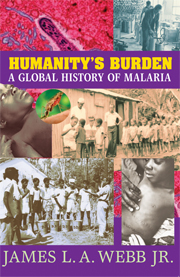Crossref Citations
This Book has been
cited by the following publications. This list is generated based on data provided by Crossref.
Stapleton, Darwin H.
2009.
Historical Perspectives on Malaria: The Rockefeller Antimalaria Strategy in the 20th Century.
Mount Sinai Journal of Medicine: A Journal of Translational and Personalized Medicine,
Vol. 76,
Issue. 5,
p.
468.
Kettle, A. James
Asbjørn Vøllestad, L.
and
Wibig, Joanna
2011.
Where once the eel and the elephant were together: decline of the European eel because of changing hydrology in southwest Europe and northwest Africa?.
Fish and Fisheries,
Vol. 12,
Issue. 4,
p.
380.
Deb Roy, Rohan
2013.
Quinine, mosquitoes and empire: reassembling malaria in British India, 1890–1910.
South Asian History and Culture,
Vol. 4,
Issue. 1,
p.
65.
Griffing, Sean M.
Viana, Giselle M. Rachid
Mixson-Hayden, Tonya
Sridaran, Sankar
Alam, Mohammad Tauqeer
de Oliveira, Alexandre Macedo
Barnwell, John W.
Escalante, Ananias A.
Povoa, Marinete Marins
Udhayakumar, Venkatachalam
and
Arez, Ana Paula
2013.
Historical Shifts in Brazilian P. falciparum Population Structure and Drug Resistance Alleles.
PLoS ONE,
Vol. 8,
Issue. 3,
p.
e58984.
Laubichler, Manfred D.
Maienschein, Jane
and
Renn, Jürgen
2013.
Computational Perspectives in the History of Science: To the Memory of Peter Damerow.
Isis,
Vol. 104,
Issue. 1,
p.
119.
Weil, David N.
2014.
Africa's Development in Historical Perspective.
p.
89.
Burlando, Alfredo
2015.
The Disease Environment, Schooling, and Development Outcomes: Evidence from Ethiopia.
The Journal of Development Studies,
Vol. 51,
Issue. 12,
p.
1563.
Webb, James L.A.
2017.
Human Dispersal and Species Movement.
p.
477.
Satish, P.V.V.
and
Sunita, K.
2017.
Antimalarial efficacy of Pongamia pinnata (L) Pierre against Plasmodium falciparum (3D7 strain) and Plasmodium berghei (ANKA).
BMC Complementary and Alternative Medicine,
Vol. 17,
Issue. 1,
Mottram, Stewart
2021.
“A most excellent medicine”: Malaria, Mithridate, and the death of Andrew Marvell.
The Seventeenth Century,
Vol. 36,
Issue. 4,
p.
653.
Naono, Atsuko
2022.
“Going ‘the Last Mile’ to Eliminate Malaria” in Myanmar?.
Centaurus,
Vol. 64,
Issue. 1,
p.
119.
Mauldin, Erin Stewart
2024.
Enslavers’ Big Lie.
Agricultural History,
Vol. 98,
Issue. 1,
p.
103.





